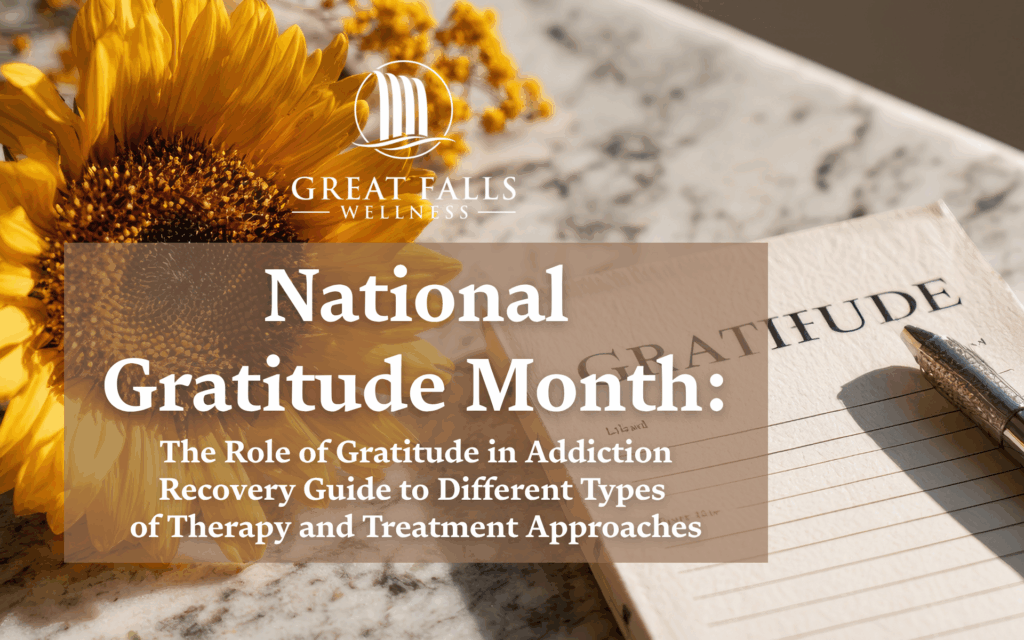
Origins of National Gratitude Month
National Gratitude Month takes place in November. It was launched in 2015 with support from Stacey Grewal, an author and life coach, to encourage people to focus on what is going well. Grewal’s idea was simple. Practicing gratitude can lift well-being, strengthen compassion, and help communities thrive. Dedicating November to thankfulness gives people time to notice blessings and build resilience during hard seasons.
For people in addiction recovery, National Gratitude Month is a natural time to recognize progress, appreciate support, and reinforce positive change. The benefits of gratitude are supported by research and can meaningfully shape the recovery process.
Why Gratitude Matters in Addiction Recovery
Gratitude connects to the idea of recovery capital, a concept introduced by William Cloud and Robert Granfield and later expanded by Cloud and William White in 2008. Recovery capital is the mix of internal and external resources that help someone sustain sobriety, including personal strengths, social ties, physical health, and emotional skills. The greater a person’s recovery capital, the stronger the foundation for long-term recovery (White & Cloud, 2008).
More recent studies place gratitude within that framework. Chen’s 2017 research identified gratitude as a form of recovery capital. Focusing on what is positive helps people maintain sobriety, build resilience, and handle ongoing challenges. As Chen notes, focusing on the positive aspects of life can be critical for sustaining recovery.
LaBelle and Edelstein’s 2018 study also found that gratitude supports recovery. Participants in 12-step programs who practiced gratitude reported greater emotional well-being and were more likely to see positive outcomes. While more research will clarify how gratitude works across recovery stages, these findings point to a powerful tool for healing.
In 2021, Charzyńska examined spiritual coping strategies such as gratitude and found that people who used gratitude remained sober longer and were more likely to complete treatment. This growing body of work highlights the role of spiritual health, including gratitude, in lasting recovery.
Gratitude as a Daily Practice
Daily gratitude can reshape how people view their recovery. As life is rebuilt, noticing what is good helps create meaning, even when days are difficult. Gratitude is not only a feeling. It is an active practice of paying attention and valuing what is helpful and true.
For those in recovery, this practice can reinforce hope. By acknowledging support from loved ones, marking personal milestones, and appreciating everyday joys, people strengthen emotional resilience and keep a balanced outlook that supports steady sobriety.
Tips for Practicing Gratitude in Recovery
- Increase your awareness. Make a conscious effort to notice small moments that bring comfort or joy. Appreciate a kind word, a bit of sunshine, or a calm breath.
- Keep a gratitude journal. Write down what you are thankful for each day. Returning to these notes can support both emotional and physical well-being.
- Express gratitude to others. Share your thanks with the people who have shown up for you. Naming your appreciation strengthens relationships and invites continued support.
- Many people in recovery lean on the Serenity Prayer as a daily grounding practice, especially during National Gratitude Month.
- Serenity Prayer: “God, grant me the serenity to accept the things I cannot change, the courage to change the things I can, and the wisdom to know the difference”. It was written by theologian Reinhold Niebuhr in 1943 and has become a cornerstone for many recovery programs, like Alcoholics Anonymous and Narcotics Anonymous.
Benefits of Gratitude in Recovery
Gratitude helps people manage the emotional ups and downs of recovery. It softens negative emotions, builds a sense of peace, and supports a forward-looking mindset. This outlook not only helps maintain sobriety but can inspire others on the path.
With consistent practice, gratitude adds to recovery capital. It becomes one of the resources that helps people stay sober and navigate the challenges that arise. During National Gratitude Month, consider making gratitude a daily habit to support emotional healing and long-term success.
How Great Falls Wellness Can Help
At Great Falls Wellness, we see the impact gratitude can have during National Gratitude Month and throughout the year. Our outpatient programs integrate practical gratitude practices to help clients focus on strengths, celebrate progress, and build resilience for lasting recovery. If you want to explore how gratitude can support your growth, contact us to learn more about personalized outpatient addiction care in Northern Virginia.
If you are exploring IOP programs or searching for “PHP programs near me,” compassionate care and steady structure can help you move forward. Great Falls Wellness offers supportive paths for individuals seeking addiction treatment Washington DC and drug addiction rehab in Virginia, with small groups, skilled clinicians, and a focus on building lasting recovery through gratitude and evidence-based care.
References
Charzyńska, E. (2021). The effect of baseline patterns of spiritual coping, forgiveness, and gratitude on the completion of an alcohol addiction treatment program. Journal of Religion and Health. https://pubmed.ncbi.nlm.nih.gov/33515388/
Chen, G. (2017). Does gratitude promote recovery from substance misuse? Addiction Research & Theory, 25(2), 121-128. https://doi.org/10.1080/16066359.2016.1212337
Grewal, S. (2015, October 30). November officially declared “National Gratitude Month” for USA and Canada [Press release]. PR Newswire. https://www.prnewswire.com/news-releases/november-officially-declared-national-gratitude-month-for-usa-and-canada-300169435.html
LaBelle, O. P., & Edelstein, R. S. (2018). Gratitude, insecure attachment, and positive outcomes among 12-step recovery program participants. Addiction Research & Theory, 26(2), 123-132. https://doi.org/10.1080/16066359.2017.1333111
White, W., & Cloud, W. (2008). Recovery capital: A primer for addictions professionals. Counselor, 9(5), 22-27. https://www.naadac.org/assets/2416/whitewlcloudw2008_recovery_capital_a_primer.pdf


